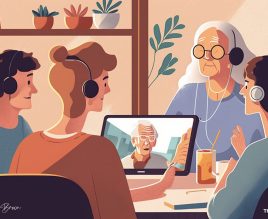Table of Contents
ToggleIn the realm of senior living, quality resident services are of paramount importance. Often, these services form the backbone of daily routines and contribute significantly to the well-being of the residents.
By addressing a wide range of needs, from medical assistance to recreational activities, resident services in senior living settings are tailored to enrich the life of every senior citizen. Given the profound impact these services can have on seniors’ lives, there is an unceasing need for continuous improvement and adaptation.
While human-centered care will always be fundamental to the senior living sector, technology can play a crucial role in refining these services. One technological innovation that holds great promise in this regard is ChatGPT, an advanced AI language model developed by OpenAI.
ChatGPT is programmed to understand and generate human-like text based on the information fed to it. The algorithm powering ChatGPT is based on machine learning, allowing the AI to “learn” from vast amounts of data and deliver highly accurate and contextually appropriate responses.
Though we generally think of AI in terms of driverless cars and robotics, its potential to transform resident services in senior living environments is both vast and intriguing. ChatGPT could revolutionize various aspects of resident services, from streamlining administrative tasks to providing companionship and cognitive stimulation for seniors.
With such potential, it’s clear that we are on the brink of a transformative era in senior care – one where artificial intelligence enhances human connection rather than replacing it.
Understanding ChatGPT and its Capabilities
To appreciate the role ChatGPT could play in senior living, one must first understand its function and features. ChatGPT is an AI model trained to understand and respond to text inputs in a human-like manner. It functions by analyzing vast amounts of data, learning patterns and context from these data, and subsequently generating responses that are contextually accurate and conversationally appropriate.
One of ChatGPT’s salient features is its ability to understand context and nuance. This ability sets it apart from conventional chatbots and allows for more personalized interactions. It can hold a conversation, answer questions, and even provide suggestions based on its understanding of the text input.
Another notable feature is its 24/7 availability. This means that ChatGPT can provide constant support, whether for answering resident queries or scheduling appointments, which could significantly enhance the accessibility and efficiency of resident services.
Moreover, ChatGPT can be customized and trained on specific data sets, allowing it to handle specialized tasks. For instance, it could be programmed to understand medical terminologies and health conditions prevalent among seniors, thus playing a potential role in healthcare support.
The Impact of ChatGPT on Resident Services

With these capabilities, ChatGPT can bring about tangible improvements in resident services’ efficiency, consistency, and availability. For instance, ChatGPT can handle administrative tasks such as scheduling appointments or answering FAQs, thus freeing up human resources for more critical tasks.
Imagine a resident who wakes up at 3 AM with a question about the day’s schedule. Instead of waiting until morning or disturbing a staff member, they could simply interact with ChatGPT to get an immediate answer. The 24/7 availability of ChatGPT can significantly enhance the accessibility and responsiveness of resident services.
By handling repetitive tasks and offering consistent responses, ChatGPT can help eliminate human error and ensure a uniform standard of service. This consistency can be especially comforting for residents who appreciate predictability and routine.
Moreover, ChatGPT can offer cognitive stimulation by engaging residents in meaningful conversations. This could enhance social interaction and mental engagement among seniors, a key component of holistic well-being.
As we imagine a world where ChatGPT is integrated into resident services, it’s clear that such a scenario is not just beneficial but potentially transformative. The fusion of AI and human-centred care could truly redefine the quality of life for seniors in living facilities.
Case Studies of ChatGPT in Senior Living
As we explore the potential of ChatGPT in senior living, it’s beneficial to delve into specific instances where this technology has been applied. These case studies serve to illustrate the tangible impact of ChatGPT, providing a glimpse into its practical implications and transformative potential.
While the integration of AI into senior living is still a relatively new frontier, certain pioneering facilities have begun experimenting with this technology. Let’s explore two specific instances of ChatGPT application in senior living, shedding light on the successes, challenges, and overall impact of this AI innovation in resident services.
Case Study 1: Pineview Senior Living Facility
Pineview Senior Living Facility introduced ChatGPT as a pilot project to assist in managing resident queries and scheduling daily activities. The facility trained ChatGPT on their specific routines and processes, enabling the AI to provide accurate and personalized responses to residents.
Over a span of six months, ChatGPT not only alleviated administrative workloads but also served as a round-the-clock companion to residents. Many seniors expressed comfort in being able to ask questions or chat with the AI at any time, illustrating ChatGPT’s potential in fostering a sense of security and companionship among seniors.

Case Study 2: Sunrise Senior Care Center
Sunrise Senior Care Center implemented ChatGPT in a different capacity – cognitive stimulation. They utilized ChatGPT’s conversational capabilities to engage residents in dialogue, aiming to enhance their cognitive functioning and social interaction.
Despite initial skepticism, the results were pleasantly surprising. Residents reported enjoying their conversations with ChatGPT, which ranged from discussing their favorite books to reminiscing about their past. The AI engagement resulted in marked improvements in residents’ mood and social interactions, highlighting the potential role of ChatGPT in mental wellness strategies for seniors.
Analysis of the Impact of ChatGPT
To appreciate the transformative potential of ChatGPT in senior living, it’s essential to delve into its impact on resident services.
Firstly, ChatGPT’s application markedly enhances administrative efficiency. Tasks like managing resident queries, scheduling activities, or providing information can be handled swiftly and accurately by the AI. This improvement liberates staff from routine tasks, allowing them to focus on more personalized care.
In terms of availability, ChatGPT operates round-the-clock, offering consistent support to residents. This 24/7 availability can be particularly comforting for residents, knowing they have an avenue for assistance or conversation at any time.
ChatGPT also shows potential in enhancing cognitive and social experiences. Engaging seniors in personalized dialogues or reminiscing activities can stimulate cognitive functioning and combat feelings of loneliness, contributing to their overall mental wellness.
On the flip side, the implementation of ChatGPT isn’t without challenges. Ensuring the AI’s responses are accurate and appropriate requires diligent training and monitoring. There may also be hesitations among some residents to interact with AI, reflecting the need for careful implementation and ongoing education to foster acceptance.
Addressing data privacy and ethical considerations also forms a critical aspect of ChatGPT’s implementation. Robust measures to protect resident data, along with a well-defined ethical framework for AI behavior, are essential to safeguard resident interests.
In summary, the impact of ChatGPT in resident services is substantial and largely positive. It presents an opportunity to improve service efficiency, availability, and even augment the social and cognitive experiences of residents. Despite the challenges, with thoughtful implementation and stringent oversight, ChatGPT can truly enhance the quality of resident services in senior living.
The Future of ChatGPT in Resident Services
As we gaze into the horizon, the potential role of ChatGPT in resident services becomes increasingly significant. This AI innovation holds the promise of not just refining existing services, but also creating new avenues for support and engagement in senior living environments. The future is ripe with possibilities, teeming with potential enhancements that could truly revolutionize senior care.

Future Trends in AI for Senior Living
As we move forward, the application of AI in senior living will likely witness dynamic advancements. Here, we’ll explore some future trends that could shape the role of AI, particularly ChatGPT, in this space.
Firstly, personalization will take center stage. AI models like ChatGPT could be trained to understand individual preferences and needs of residents, thereby offering highly personalized care. Whether it’s knowing a resident’s favorite activities or understanding their health requirements, ChatGPT could play a critical role in offering tailored resident services.
Secondly, AI might extend its role into health management. This could involve ChatGPT assisting with medication reminders, dietary advice, or even early signs of health deterioration. AI could also be a valuable tool for mental health, offering therapeutic conversations and cognitive exercises.
Thirdly, AI could facilitate better communication between residents, staff, and families. ChatGPT could help maintain logs of residents’ daily activities, health, and mood, which can be shared with authorized family members, fostering transparency and trust.
Moving forward, we can anticipate several exciting trends in the application of AI, like ChatGPT, in senior living. A potential area for expansion could be personalizing resident services based on individual needs and preferences, leading to an even more tailored care experience.
ChatGPT could also extend its role in health-related matters. Imagine AI assisting with medication reminders or providing first-line responses to health queries. There’s also potential in utilizing AI for cognitive health strategies, using customized conversations to stimulate mental engagement or monitor cognitive function.
However, these advancements will also bring challenges. User adaptability, especially among seniors unfamiliar with technology, is a concern. Privacy issues around data collection and use, and the risk of dependency on AI, are other potential issues. Addressing these would require thoughtful strategies involving user education, strict privacy protocols, and balancing AI with human care.
Ethical and Privacy Aspects
The introduction of AI into senior living must be guided by stringent ethical and privacy considerations. Ethically, it’s essential that AI does not replace human care but complements it. The human touch in care can’t be underestimated, and AI should be used to free up human resources for more personalized care, rather than replace them.
Ethical concerns include ensuring the AI’s responses are always respectful and appropriate. That the use of AI does not compromise human interaction and care. Strategies to address this may include setting clear guidelines on the role of AI. Ensuring human staff are always available for direct interaction.
Privacy and data security are equally critical. With AI collecting and learning from data, robust measures must be in place to protect residents’ information. Regular audits, stringent data handling policies, and secure data storage can help ensure the privacy of residents. While they benefit from the advantages of AI like ChatGPT.
The future of ChatGPT in resident services is an exciting prospect, and by ensuring ethical, privacy, and user adaptability aspects are thoroughly addressed. We can ensure this future is both bright and secure.
Conclusion
In our exploration of ChatGPT’s role in senior living, we’ve traversed the intriguing intersection where modern technology meets empathetic care. Through this journey, it has become clear that AI, particularly ChatGPT, carries the potential to significantly enhance the quality of resident services in senior living.
ChatGPT’s ability to streamline administrative tasks, offer round-the-clock assistance. And enriching residents’ cognitive and social experiences marks a significant advancement in senior care. It’s also fascinating to contemplate the potential future trends of AI in this sector. From even more personalized services to integration into health management and family communication.
However, this technological leap is not without its hurdles. The importance of ensuring user acceptance, setting robust ethical guidelines, and implementing stringent data privacy measures cannot be understated. Each step toward the broader adoption of AI in senior living must be carefully measured, ensuring that technology serves as a tool that enhances human care, not as a replacement.
ChatGPT’s journey in the realm of senior living is just beginning. It’s both an exciting and demanding path, involving constant learning, adaptation, and refinement. The ultimate goal should always remain the same: to enhance the quality of life for seniors. If ChatGPT and other AI technologies can contribute to this goal, then we’re truly on the brink of a transformative era in senior living.
As we continue to navigate this space, let’s remember the successful integration of AI. Senior living is not just about technological advancement. It’s about coupling that advancement with empathy, respect, and a deep understanding of the needs of seniors. That’s the future we should strive for. A future where technology and humanity go hand in hand to ensure the well-being of our seniors.
FAQs
What is ChatGPT?
ChatGPT is an advanced AI language model developed by OpenAI. It’s programmed to understand and generate human-like text based on the information it’s fed. This allows for more personalized interactions, such as holding a conversation or answering questions.
How can ChatGPT benefit resident services in senior living facilities?
ChatGPT can improve administrative efficiency by handling tasks such as scheduling appointments or answering frequently asked questions. Its 24/7 availability means it can provide constant support to residents. Moreover, it can engage residents in meaningful conversations, offering cognitive stimulation and companionship.
What are the future prospects for AI in senior living?
As AI continues to evolve, it’s likely we’ll see it playing a more integral role in senior care. Future applications could include personalized care plans, mental health strategies, and telemedicine. All aimed at improving the quality of life for seniors.
Can ChatGPT help in health management in senior living facilities?
In the future, it’s plausible that ChatGPT could assist with aspects of health management. This might involve providing medication reminders, dietary advice, or early signs of health deterioration. However, any health-related application of AI should always be supervised by healthcare professionals.
How can we ensure the ethical use of ChatGPT in senior living facilities?
Ensuring the ethical use of ChatGPT involves several steps, including establishing a robust ethical framework for AI behaviour. Involving the residents in the decision to use AI, and ensuring that AI is used as a tool to enhance human care, not replace it.
How can we foster user acceptance of AI like ChatGPT in senior living facilities?
Fostering user acceptance can involve user education about the benefits. And use of AI, providing assistance to residents in their interactions with AI, and slowly integrating AI into daily routines. Feedback from residents should also be continuously sought and used to improve the AI experience.
Reference
- https://www.researchgate.net/
- https://healthdimensionsgroup.com/
- https://www.huddleteams.io/

















